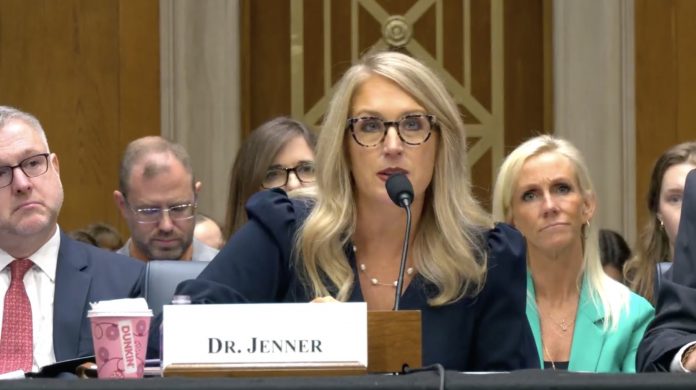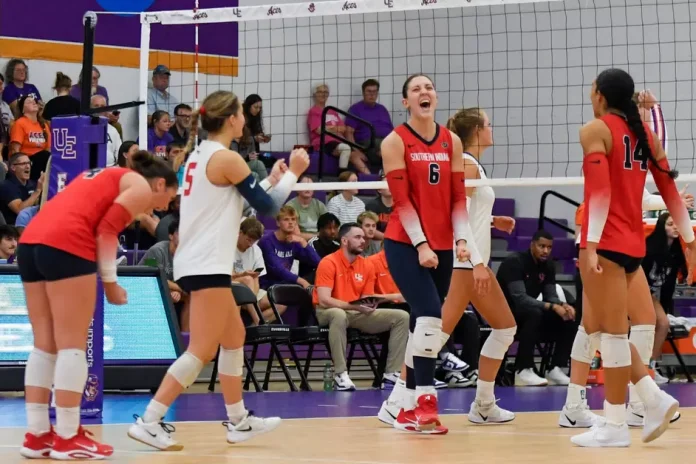|
By Shauneen Miranda , Indiana Capital Chrnoicle Katie Jenner, Indiana’s secretary of education and the state’s commissioner for higher education, pointed to some of the initiatives in her state to improve students’ academic performance. “Over the past three years, Indiana rebuilt early literacy based on the science of reading,” she said. “Backed by a major public-private partnership with Lilly Endowment, we have trained thousands of teachers, expanded coaching, and districts are adopting evidence-based materials.” WASHINGTON — Just days after federal data revealed average reading, math and science scores dropped among certain grades since before the coronavirus pandemic, a U.S. Senate panel on Thursday picked apart the root causes and methods for students’ academic improvement. The hearing in the Senate Committee on Health, Education, Labor and Pensions centered on the “state of K-12 education” — which GOP members on the committee described as “troubling” — in light of recent data from the National Assessment of Educational Progress, or NAEP. NAEP, regarded as the gold standard for tracking students’ academic performance, showed that average science scores for eighth-graders decreased by 4 points since before the pandemic, in 2019. Average math and reading scores for 12th-graders also fell 3 points between 2019 and 2024. The assessments were administered between January and March of 2024. Results also showed that just one-third of 12th-graders are considered academically prepared for college in math — a drop from 37% in 2019. The committee’s chair, Sen. Bill Cassidy, said “it should concern us that children’s reading, math and science scores have yet to recover to pre-pandemic levels.” The Louisiana Republican added that “success in education is not determined by how much we spend, but by who makes the decision and how wisely resources are directed,” and “when states and local communities are empowered to tailor solutions to meet the unique needs of students, innovation follows.” On the other hand, Sen. Bernie Sanders, ranking member of the panel, said that “while we focus on education — as important as that is — we also have to focus on the conditions under which our children are living.” The Vermont independent noted that “when you’re looking at the real world out there, we’re looking at millions of families that are struggling to put food on the table, to pay the rent, kids who are growing up in dysfunctional families.” He said that while he’s glad the committee is focusing on these issues, “we have got to understand education is important — that means prioritize our children, prioritize our educators.” Role of technology in educationMartin West, vice chair of the National Assessment Governing Board, which oversees and establishes policy for NAEP, said that while the assessments generally measure what’s happening to student achievement rather than the causes, “the patterns it documents can guide our search for explanations and solutions.” He said the rise in smartphones and social media platforms that target youth is, in his view, one area to investigate. “We lack direct evidence of a causal link between smartphones and learning, but I’m convinced that this technology is a key driver of youth mental health challenges, a distraction from learning, both inside and outside of schools, and a deterrent to reading when NAEP surveys reveal that many fewer students read on their own for fun,” he said. Indiana’s approachKatie Jenner, Indiana’s secretary of Education and the state’s commissioner for higher education, pointed to some of the initiatives in her state to improve students’ academic performance. “Over the past three years, Indiana rebuilt early literacy based on the science of reading,” she said. “Backed by a major public-private partnership with Lilly Endowment, we have trained thousands of teachers, expanded coaching, and districts are adopting evidence-based materials.” Jenner pointed to the Hoosier State seeing a historic jump in reading scoresfor third-graders this year, with a rise of nearly 5 percentage points from the previous year. The state is also working on helping secondary students who continue to struggle with reading, including “deploying an outcomes-based contracting pilot, specifically for middle school reading in areas like tutoring and targeted interventions.” Jenner said Indiana is also “rethinking high school” and “overhauled our diplomas, added outcomes-based incentives to our school funding formulas and ensured the connection to school accountability.” ‘State of education in shambles’Meanwhile, some Democrats on the panel blasted President Donald Trump’s dramatic overhaul of the federal role in education as he seeks to dismantle the Education Department. Though the assessments were conducted long before the start of Trump’s second White House administration, Democrats pointed to the changes the department has undergone since he took office again and their impact on students. “I’m really glad that we are holding this hearing on the state of education because I am seeing the state of education in shambles under this Department of Education, where the president vowed to dismantle the Department of Education, he set immediately to work to tear apart programs that support our students and schools — no regard to the law or the consequences or even what’s best for our students,” said Sen. Patty Murray of Washington state. “So, I see the state of education as delayed and frozen, canceling funding, robbing our schools of support for our teachers and our supports and services kids need to succeed,” she said. Murray expressed concerns that “instead of working with us to fix the education system, Trump and the secretary of Education (Linda McMahon) are making it a lot worse.” |
Decline in K-12 national reading, math, science scores probed by US Senate panel
Attorney General Todd Rokita exposes public posts from educators glorifying Charlie Kirk’s assassination
Attorney General Todd Rokita’s office is actively reviewing public submissions regarding posts made by educators and administrators that glorified the tragic assassination of Charlie Kirk.
According to Attorney General Rokita, his office has received hundreds of submissions through the Eyes on Education portal over the past week and is evaluating them for posting on a rolling basis. There are currently nine submissions live with many more expected over the coming days.
“Freedom of speech is a cornerstone of our Republic, but it does not shield individuals from the consequences of their words, especially when they are public servants who are getting paid with taxpayer dollars,” said Attorney General Rokita. “Statements that celebrate or glorify violence are deeply concerning, particularly when made by those entrusted with shaping young minds. Our office is committed to transparency by sharing verified submissions on the Eyes on Education portal, where many examples are already available.”
The Eyes on Education portal is a tool to help empower parents and community members to engage in their children’s education by submitting and reviewing materials or statements that may be inappropriate in school settings. Since the assassination of Charlie Kirk, the portal has received numerous reports around the state of public comments or shared posts celebrating or glorifying the tragedy.
In recent days, several educators, including an administrator at Ball State University, have faced consequences, including resignations or terminations. Ball State University referenced Hedgepeth v. Britton, a federal ruling allowing schools to discipline employees whose public statements disrupt operations or undermine public trust.
Attorney General Rokita said Ball State’s legal analysis was correct and other higher education institutions, as well as secondary and elementary school boards, superintendents, principals and their attorneys should take notice.
To submit a report to the Eyes on Education portal, visit in.gov/attorneygeneral, select “Eyes on Education,” choose the school corporation and name, and upload relevant documents. A member of the Attorney General’s office may contact submitters for additional information. Verified submissions will be published regularly.
“Let me be clear: my office is not conducting investigations into these individuals,” Attorney General Rokita said. “Our goal is to provide transparency, equipping parents with the information they need to make informed decisions about their children’s education.”
Purple Aces to Host UIC to Open Valley Play
EVANSVILLE, Ind. – The University of Evansville women’s soccer team opens Missouri Valley Conference play on Saturday when they play host to UIC. Kick-off is set for 4 PM at Arad McCutchan Stadium.
Evansville’s 4-2-1 record entering conference play is their best mark since 2021, when the Purple Aces came into MVC play at 4-0-3.
Last Time Out
Evansville suffered their loss since August 21st on Sunday, falling to Middle Tennessee by a score of 2-0 at Arad McCutchan Stadium.
Middle Tennessee jumped out to an early lead on an Evansville own goal in the 8th minute and added another goal in the 40th minute to take a 2-0 into the halftime intermission.
The Blue Raiders continued to hold the Aces at bay in the second half, despite seven Evansville shots. The best scoring opportunities for Evansville came in the final seven minutes of play, with Vasquez and Olivia Colson (Waterloo, Ill./Waterloo) putting shots on goal, but a pair of saves from Blue Raiders keeper Ella Sellers kept Evansville off the scoreboard.
Emma Nathans (Toronto, Ontario/Havergal College) made her first collegiate start in goal for the Aces, making four saves. Colson also made her collegiate debut with 17 minutes of action. 22 different Aces saw the field in the match.
Series History
Sunday marks the fourth all-time meeting between Evansville and UIC. The Flames hold the series lead at 2-1. UIC won last season’s meeting, a 1-0 win in Chicago.
METS Micro to Expand Into Jacobsville
The City of Evansville today announced the expansion of its growing METS Micro transit program into the Jacobsville neighborhood, thanks to a generous grant from Deaconess Health System.
The expansion, which adds .4 square miles and 800 residents to the METS Micro service area, brings the program’s total coverage to 20.5 square miles and 66,900 residents served. It also extends METS Micro access to several key destinations including the Civic Center, Ford Center, Victory Theatre, CK Newsome Center, Old National Events Plaza, Denton Federal Building, USPS, and Deaconess Midtown Hospital.
Originally launched as a pilot in 2023, the METS Micro program has rapidly grown in both ridership and reach. As of September 1, 2025, METS Micro had provided 38,688 rides this year, up from 22,674 during the same period in 2024.
“Reliable, affordable transportation is a basic need,” said Evansville Mayor Stephanie Terry. “With this expansion, more Evansville residents can get to vital services, jobs, and schools without added financial strain. I appreciate Deaconess for partnering with us to make transit more convenient and affordable for the families we serve.”
The new zone, which will go live on Monday, September 22, enhances mobility options for residents of Jacobsville while connecting more Evansville residents to vital services, civic spaces, and job centers.
Todd Robertson, Executive Director of Transportation & Services, called the expansion a reflection of the program’s mission to better meet the needs of underserved communities.
“Our goal with METS Micro has always been to fill in the transit gaps – to make it easier for people to move around their city,” Robertson said. “This expansion helps us do just that, bringing flexible, on-demand service to more residents and key destinations, thanks in large part to the generosity of Deaconess.”
“Access to reliable transportation is directly tied to access to health care, jobs, and community resources,” said Dr. Brad Scheu, President of Deaconess Central Region. “At Deaconess, we know that health doesn’t begin or end at the hospital doors—it’s shaped by many factors, including whether someone can get to an appointment, a workplace, or the services that help them thrive. We’re proud to partner with the City to expand METS Micro and help make Evansville a healthier, more connected community.”
METS Micro rides can be scheduled via the METS Micro app or by phone, offering affordable, curb-to-curb transportation within the zone. Details on the expanded service area, including zone maps and how to ride, are available at https://city.ridewithvia.com/metsmicro
Aces Head to Terre Haute for John McNichols Invitational
EVANSVILLE, Ind. – The University of Evansville men’s and women’s cross country teams make the trip to Terre Haute on Saturday, competing in the John McNichols Invtiational hosted by Indiana State. The men’s 8K race is scheduled for 8 AM CT, with the women’s 6K race to follow at 8:45 AM CT.
Evansville is coming off dominant victories in their last competition, sweeping the women’s 5K and men’s 6K events at the Panther Prowl.
Evansville’s women’s team took the title with the top four individual finishers and seven of the top 10. Chase Hayes (Noblesville, Ind./Western) cruised to the individual title, finishing at 18:03.9. Avery Stephens (Newburgh, Ind./Castle) finished second at 18:49.9, followed by freshmen Kyleigh Wolf (Columbus, Ind./Columbus North) with a time of 19:04.5 and Josie Lynch (Brazil, Ind./Northview) at 19.26.9. Kyndall Anthis (Patoka, Ind./Princeton Community), Lauren Bradley (Russiaville, Ind./Western) and Veronica Wilgocki (Chesteron, Ind./Chesterton) secured top ten finishes as well with times of 19:55.1, 20:05.6, and 20:25.7 respectively.
On the men’s side, freshman James Cruse (Melbourne, Australia) won the collegiate race and finished second overall as the Aces’ top finisher with a time of 18:48.3. Cruse was named MVC Men’s Runner of the Week for his performance. Nathan Whitehead (Vincennes, Ind./South Knox) also placed in the top five, finishing fourth at 19:14.7. Tanner Spence (Carmi, Ill./Carmi) and Nathan Campbell (Bloomington, Ind./Bloomington North) also placed inside the top ten with times of 19:26.5 and 19:37.7, respectively. Evansville took the team title with a score of 26, a margin of victory of 47 ahead of the second place squad.
Saturday’s meet will be hosted at the Lavern Gibson Championship Cross Country Course in Terre Haute (599 S. Tabortown St. Terre Haute, IN 47803). Live results can be found here.
EPD DAILY ACTIVITY REPORT
FOOTNOTE: EPD DAILY ACTIVITY REPORT information was provided by the EPD and posted by the City-County-County Observer without opinion, bias, or editing.
USI Volleyball wins in four-set thriller over Purple Aces
EVANSVILLE, Ind.- In a four-set thriller, University of Southern Indiana volleyball takes down crosstown rival University of Evansville to win its third straight between the two schools.
Set 1: USI 25, UE 20
The crosstown rivalry started in a back-and-forth fight between the Eagles and Aces, with 11 tie scores in the first set. Junior Ashby Willis led the court with six kills, followed by senior Bianca Anderson with four. The Screaming Eagles maintained a .371 hitting percentage in the first. In the back court, sophomore Audrey Small picked up six digs, followed by senior Keira Moore who had four.
Set 2: USI 25, UE 22
The Screaming Eagles took the lead by the 12th point and maintained it for the rest of the second set. Willis landed six more kills, followed by Anderson and junior Leah Coleman with three each. Freshman Aysa Thomas connected on 11 assists, adding to her 13 from set one. Small had her best set, picking up seven digs.
Set 3: UE 25, USI 23
The Aces started strong, making USI fight back from behind, with 13 tie scores for the third. Evansville took the final lead with two points left. Junior Leah Coleman had her most dominant set, putting down seven kills, while Willis found the court eight times.
Set 4: USI 25, UE 20
USI played their best defense to finish out the match in the fourth. The Eagles had 25 team digs, with everyone on the court picking up at least one, led by Small with five. At the net, USI’s defense put up four blocks, led by Anderson and Coleman, each with two. The offense put together the best hitting percentage of the match in the final set at .417, led by Thomas, who dished out 16 assists.
For the game, three Screaming Eagles finished in double-digit kills, Willis (24), Coleman (18), and Anderson (10). Willis and Coleman’s kills earned them new career highs. Thomas led her offense to a season-high hitting percentage at .349, recording a career-high 53 assists. In the back court, the Eagles out-dug the Aces 72-63, led by libero Small, who finished with 19.
Next up, the Screaming Eagles will take their turn to host Evansville in Liberty Arena on Saturday at 4 p.m. for the first annual “Battle for the Lloyd” match.
Mayor Terry to Join Deaconess, METS for METS Micro Announcement This Morning
Evansville Mayor Stephanie Terry will join representatives of the Metropolitan Evansville Transit System (METS) and Deaconess Health System today at 10:00 for an exciting announcement about the METS Micro program.
The announcement will take place at Deaconess Midtown campus, 600 Mary St., near the front doors.
Community Development Block Grants now open for applications
The Office of Lieutenant Governor Micah Beckwith and the Indiana Office of Community and Rural Affairs announced the second round of Community Development Block Grants for 2025 is now open for applications.
The following programs are accepting applications.
- Blight Clearance
- Main Street Revitalization
- Public Facilities
- Stormwater Improvements
- Wastewater/Drinking Water
A series of updates have been made to the CDBG program that are in effect for Round 2 of 2025.
- Program-specific alignment for Wastewater/Drinking Water grants: OCRA has adjusted the WDW program to reflect new benchmarks established by the Legislative Taskforce. These updates are designed to ensure compliance with revied user rate thresholds.
- Public Facilities program expanded to include historic preservation: The scope of Public Facilities program will expand to include supporting rehabilitation and restoration of historical structures, preserving architectural heritage.
- Promote effective building practices: Modifications to the Main Street Revitalization and Public Facilities programs will promote efficient construction and renovation practices, encouraging long-term cost savings for municipalities and residents.
- Residential Blight Clearance initiative expanded: In response to evolving community needs, the Blight Clearance program now includes residential properties, enabling local governments to address substandard housing and promote safe and healthy communities.
- Support for disaster-impacted communities: Additional bonus points will be awarded to non-entitlement communities recovering from natural disasters and facing heightened financial needs, improving their abilities to secure CDBG funding.
- National Objectives guidelines: The criteria for assigning points to National Objectives remain unchanged, but now explicitly incorporate the guidelines into application materials to give applicants a clear understanding of the established practices.











